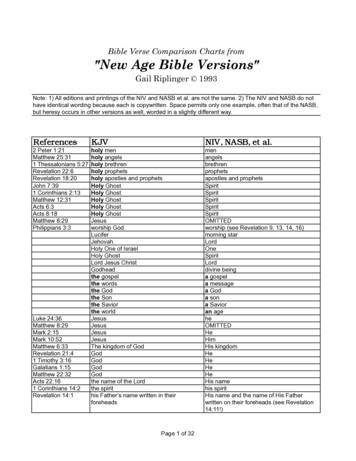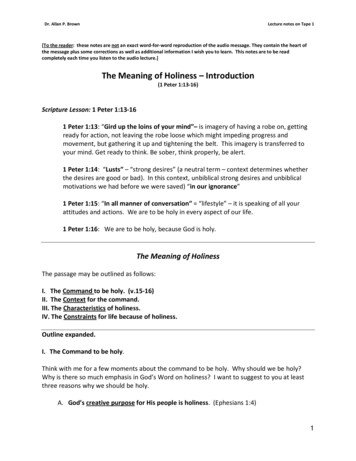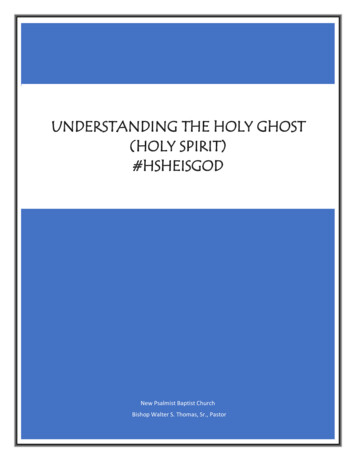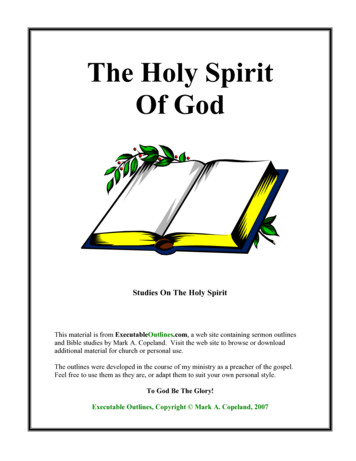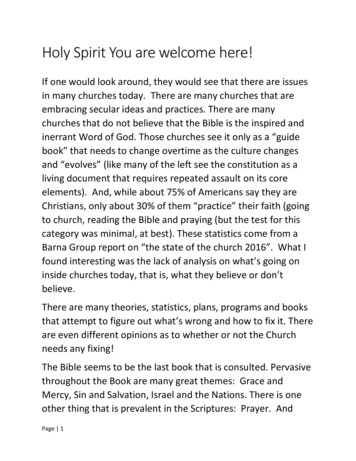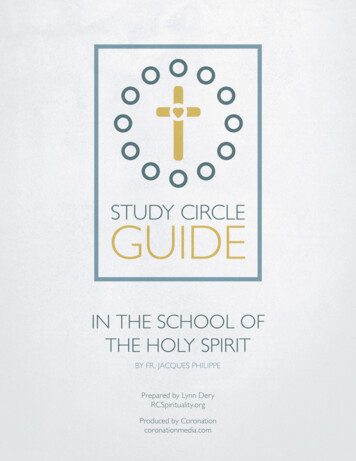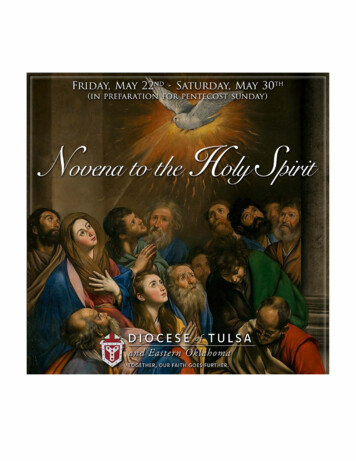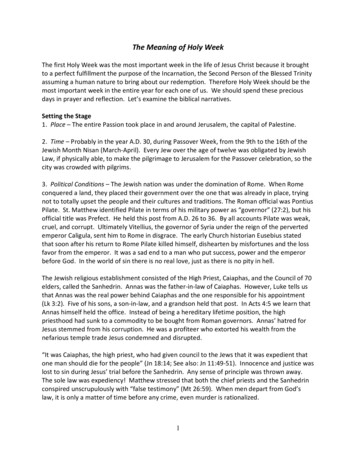
Transcription
The Meaning of Holy WeekThe first Holy Week was the most important week in the life of Jesus Christ because it broughtto a perfect fulfillment the purpose of the Incarnation, the Second Person of the Blessed Trinityassuming a human nature to bring about our redemption. Therefore Holy Week should be themost important week in the entire year for each one of us. We should spend these preciousdays in prayer and reflection. Let’s examine the biblical narratives.Setting the Stage1. Place – The entire Passion took place in and around Jerusalem, the capital of Palestine.2. Time – Probably in the year A.D. 30, during Passover Week, from the 9th to the 16th of theJewish Month Nisan (March-April). Every Jew over the age of twelve was obligated by JewishLaw, if physically able, to make the pilgrimage to Jerusalem for the Passover celebration, so thecity was crowded with pilgrims.3. Political Conditions – The Jewish nation was under the domination of Rome. When Romeconquered a land, they placed their government over the one that was already in place, tryingnot to totally upset the people and their cultures and traditions. The Roman official was PontiusPilate. St. Matthew identified Pilate in terms of his military power as “governor” (27:2), but hisofficial title was Prefect. He held this post from A.D. 26 to 36. By all accounts Pilate was weak,cruel, and corrupt. Ultimately Vitellius, the governor of Syria under the reign of the pervertedemperor Caligula, sent him to Rome in disgrace. The early Church historian Eusebius statedthat soon after his return to Rome Pilate killed himself, dishearten by misfortunes and the lossfavor from the emperor. It was a sad end to a man who put success, power and the emperorbefore God. In the world of sin there is no real love, just as there is no pity in hell.The Jewish religious establishment consisted of the High Priest, Caiaphas, and the Council of 70elders, called the Sanhedrin. Annas was the father-in-law of Caiaphas. However, Luke tells usthat Annas was the real power behind Caiaphas and the one responsible for his appointment(Lk 3:2). Five of his sons, a son-in-law, and a grandson held that post. In Acts 4:5 we learn thatAnnas himself held the office. Instead of being a hereditary lifetime position, the highpriesthood had sunk to a commodity to be bought from Roman governors. Annas’ hatred forJesus stemmed from his corruption. He was a profiteer who extorted his wealth from thenefarious temple trade Jesus condemned and disrupted.“It was Caiaphas, the high priest, who had given council to the Jews that it was expedient thatone man should die for the people” (Jn 18:14; See also: Jn 11:49-51). Innocence and justice waslost to sin during Jesus’ trial before the Sanhedrin. Any sense of principle was thrown away.The sole law was expediency! Matthew stressed that both the chief priests and the Sanhedrinconspired unscrupulously with “false testimony” (Mt 26:59). When men depart from God’slaw, it is only a matter of time before any crime, even murder is rationalized.1
4. Developments – Jesus had been preaching the Kingdom of God, working miracles, and finallyclaiming to be the Messiah. He was becoming so popular that the High Priest and his cohortssaw in Him a serious threat to their privileged authority over the people. The recent raising ofLazarus from the dead caused many Jews to believe in Jesus. The Jewish leaders even thoughtto kill Lazarus, but they were determined to kill Jesus. However, as a conquered nation, theycould not put anyone to death. Only the Roman Governor had the power to condemn acriminal to death.PALM SUNDAYBeginning with Jesus’ triumphal entrance into Jerusalem, St. Matthew brings to a climax thetheme that Jesus is the Messiah, the Son of David, and the fulfillment of the Davidic promises.Jesus, the Lord of history, came to Jerusalem to claim his kingdom and to judge Israel.Jesus began his procession from Bethphage, which means the “house of figs”. Bethphage waseast of Jerusalem between Bethany and Jerusalem. St. Thomas points out that Bethphage wasa mile distant from Jerusalem. That made it an ideal residence for the Levitical priests whowere forbidden to travel more than a mile on the Sabbath.1 Jesus, the new Adam (1 Cor 15:22,45; Rom 5:14), entered the holy city from the east to repair the damage caused by the sin ofthe first Adam who was driven to the east when he was cast out of the garden of Eden (Gen3:24). This was symbolically significant because the Jews believed that the original Garden ofEden existed in the place where Jerusalem and the Temple stood.The rabbis of the first century taught that the Messiah would come either as a conquering heroon a white steed, or as a king on a donkey.2 They believed he would come on an ass if thepeople’s hearts were closed, but on a horse if their hearts were repentant.Jesus entrance into Jerusalem had the desired effect. He “stirred” (Mt 21:10) the city. TheGreek, seio, is quite a bit stronger than “stirred”. In the Bible this word was used to describe anearthquake. In this passage it has the meaning of an emotional and spiritual upheaval thatalmost reached riotous proportions. The Messiah has come the old Jerusalem to lead hispeople into the new Jerusalem, his Church.The scene Matthew portrayed recalled Solomon’s coronation. Jesus rode a colt and Solomonrode David’s mule (1 Kgs 1:32-40). Both entrances were accompanied by a crowd celebrating (1Kgs 39-40). In both cases Jerusalem was in a state of turmoil and excitement (1 Kgs 1:45).Jesus’ coming will force everyone to take a stance, to make a choice. It is always that way. Theissue confronting individuals and nations is simply this. Are we going to do things God’s way orour way? Will we be obedient or disobedient? Will we embrace the whole gospel message, orwill we pick and choose forming our own religion? Earlier Jesus declared: “He who is not with1Summa, VI, Part II, p. 704.Matthew speaks both of a she-ass and a colt, which refers to a young horse or ass (21:2, 6). St. Jerome sees in thetwo beasts symbols of Israel, the donkey, and the Gentiles, the colt.22
me is against me, and he who does not gather with me scatters” (Mt 12:30). Once he enteredJerusalem Jesus confronted the religious establishment in the temple itself.MONDAY OF HOLY WEEKAnointing at Bethany (Jn 12:1-12)The “nard” (Jn 12:3) Mary used was an aromatic oil that was also called spikenard. It camefrom northern India in sealed alabaster boxes. We learn that “the house was filled with thefragrance of the ointment.” These words recall a line from the Song of Solomon: “While theking was on his couch, my nard gave forth its fragrance” (Song 1:12). This is insightful becausethe Song of Songs uses words of passionate marital love to describe God’s love for his bride, theChurch, and her love for him.Judas pegged the price of this ointment at “three hundred denarii” (Jn 12:4). This sum wasequivalent to a workingman’s wage for one year. If the average wage for one year in the U.S. is 30,000 that sum helps us translate the cost of the nard in modern terms. Judas knew the priceof material things, but he did not know the price of his soul! Do we know the price of our souland cherish it? The irony is that Judas subsequently sold his soul for “thirty pieces of silver” (Mt26:15), an amount equal to a tithe in relation to the value of the nard.The great cost of the nard expressed Mary’s immense love for Jesus. Steve Ray suggests thatthis “perfume may have represented Mary’s life savings.”3 Throughout the centuries Christianshave spent large sums of money on their churches because they wanted to give God their best.God, of course, does not need our money, but he does ardently desire our hearts. What can wedo to give our best to Jesus by surrendering our hearts? What attachments hold us back?Mary understood that Jesus was the Temple without price. Her actions proclaimed, “I yield mywhole being to you, everything.” She possessed the loving heart of the bride in the Song ofSongs: “Your name is oil poured out; therefore the maidens love you” (Song 1:3). Like the bridein this beautiful poem, Mary serves as a type of the Church. Jesus said that she “performed agood service” (Mt 26:10) for me, that is, she exhibited the total response to love that each of usis called to give Jesus.John informs us that Judas objected to Mary’s action because he was a thief, “not that he caredfor the poor” (Jn 12:6). This expression is the same phrase St. John used earlier about thehireling who “cares nothing for the sheep” (Jn 10:13). The hireling “flees” (Jn 10:13) whendanger threatens. Judas will become a traitorous spy and traitor in collusion with the priests.On Holy Thursday he will flee the upper room in the darkness of sin to betray Jesus. In starkcontrast to Mary, Judas loved money not Jesus.3St. John’s Gospel, p. 239.3
Cleansing the TempleAll Gentiles were forbidden to enter any of the inner courts of the temple, which were reservedexclusively for specified classes of Jews. The penalty for violating these relegations was death.Nevertheless, there was an immense outer court where Gentiles could enter and pray. Becausemany Jews came to the temple from great distances, they needed to purchase animals forsacrifice, or pigeons or doves if they were poor (Lk 12:6; Lk 2:22-24). The Sanhedrin approvedfour market places for conducting this necessary business. All were placed outside the templein the area of the Mount of Olives.However, when Caiaphas became high priest he allowed this trading to move into the court ofthe Gentiles within the temple. This created two abuses. First it perverted the Court of theGentiles into a raucous marketplace. This repelled Gentiles from coming into the temple topray to the true God. Mark’s Gospel, which was written for a Gentile audience, quotes Jesus asdeclaring: “My house shall be called a house of prayer for all nations” quoting Isaiah 56:7 (Mk11:17).Secondly, the business was conducted dishonestly. Pilgrims were cheated in two ways. FilthyRoman money could not be used in the temple so it needed to be exchanged for ritually puretemple money, often at an unfair exchange rate or an exorbitant commission. The sale ofanimals was another opportunity for fraud. Prices were often elevated and defective animalswere sold. Thus, citing Jeremiah 7:11, Jesus accused the sellers and moneychangers of makingthe temple “a den of robbers” (Mt 21:13).Jesus’ bold cleansing of his Father’s house was a declaration of his dual sonship. He is the Sonof God, and the Son of David. His actions fulfilled the prophecy of Malachi: “and the Lordwhom you seek will suddenly come to his temple; the messenger of the covenant in whom youdelight, behold he is coming, says the Lord of hosts. But who can endure the day of his coming,and who can stand when he appears? For he is like a refiner’s fire and like fullers’ soap; he willsit as a refiner and purifier of silver, and he will purify the sons of Levi and refine them like goldand silver, till they present right offerings to the Lord. Then the offering of Juda and Jerusalemwill be pleasing to the Lord as in the days of old and as in former years” (Mal 3:1-4).TUESDAY OF HOLY WEEKJesus Curses the Fig Tree (Mt 21:18-22)Why did Jesus curse the fig tree? Was he short tempered? Did he forget to have his morningcup of coffee or skip breakfast? Let’s consider the facts. Jesus was hungry. He saw a lushlooking fig tree that had no fruit, but “it was not the season for figs” (Mk 11:13). Then Jesuscursed the tree and it withered. How does this make any sense? Why would the Holy Spiritinspire Matthew and Mark to relate it?4
In the Old Testament the fig tree was frequently used as a symbol of the Hebrew people.4Adam and Eve covered their nakedness with fig leaves after the fall (Gen 3:7). Theidentification of the forbidden fruit with the apple is connected with artistic representationsduring the middle ages. It is based on a pun around the two words malum, “apple,” and malus,“evil,” or “evil deed”. The apple, the malum, represented the malus, the evil deed.Cursing the fig tree was a parable in action. Israel was like the fig tree in that it looked lush, butit bore no fruit. When God looked into the hearts of his people he found evil. Therefore Godwill bring down covenantal judgment on his wayward children.5 The cursing of the fig tree wasan ominous signal that Jesus was calling down covenantal curses.It is not a reach to apply this parable of action to contemporary Catholicism in the U.S.A. Untilthe mid 1960’s the American Church looked robust and healthy. However, that were two deepseated cancers that was sapping our vitality: pride and the resulting neglect of prayer andgenuine piety. Forty years after the rebellion over contraception it is evident that manyAmerican Catholics neither know nor live their faith. They are cultural Catholics who pick whatis convenient and discard what goes against the grain. Some prominent Catholics evenpublically foster and propagandize sinful behavior that contradicts the teaching of the Church.Covenantal judgment is already upon us in the form of “immorality, impurity, licentiousness,idolatry, sorcery (literally, the taking of drugs), enmity, strife, jealousy, anger, selfishness,dissension, party spirit, envy, drunkenness, carousing, and the like” (Gal 5:20-21) – evils that St.Paul calls the “works of the flesh” in contrast with “the fruit of the Spirit” (Gal 5:19, 22-24). Heconcluded: “those who do such things shall not inherit the kingdom of God” (Gal 5:21). It couldget worse in our country. That is why it is so important that each of us daily make the fullcommitment – totus tuus, “totally yours”.In the Book of Revelation John was instructed to write letters to seven churches. Each letterhad a three-fold emphasis. They focused on challenges each church was facing, theyrecapitulated specific stages of salvation history, and they looked to the future. The last of theletters was addressed to the church in Laodicea, which represented Pharisaical Judaism. Jesussaid to this church, “Would that you were cold or hot” (Rev 3:15)!Often that expression “cold or hot” is identified with lukewarmness in the sense that thischurch was lacking in fervor. Not so! Jesus declared that their behavior was so putrid he willvomit them out of his mouth (Rev 3:16). Their boast was, “I am rich, I have prospered, and Ineed nothing,” but Jesus judged them quite differently, “you are wretched, pitiable, poor, blind,and naked” (Rev 3:17). We need to pray that our country will not be so judged.Are we to believe that in 2,000 years there has not been a single Christian with mountainmoving faith? Of course not. We need to understand that in verse 21 Jesus is speaking4Jdg 9:11; Jer 24:2-3; 1 Kgs 4:25; 2 Kgs 18:31; Song 2:13; Is 36:16; Jer 8:13; Hos 9:10; Joel 1:12; 2:22; Mi 4:4;Hab 3:17; Hag 2:19; Zech 3:10.5Is 34:4; Hos 9:10, 16; Joel 1:7, 12; Mic 7:1-7; Jer 8:8-13.5
prophetically. In the generation that followed the Resurrection, the Apostles preached theword of God inflamed by the Holy Spirit. Tragically, the Jewish nation as a whole remainedhardhearted. Like Jesus the Apostles were persecuted and killed. Their faith cast “thatmountain,” Jerusalem and its temple, into the “sea” of Roman legions in 70 A.D. (Mt 21:21).Prayer and conversion is our atomic weapon to prevent a similar fate from falling on ourcountry.Jesus Delivers Three Parables1. Two Sons (Mt 21:28-32) Jesus concluded with these words:“Truly, I say to you, the tax collectors and the harlots go into the kingdom of God beforeyou. For John came to you in the way of righteousness, and you did not believe him, butthe tax collectors and the harlots believed him; and even when you saw it, you did notafterward repent and believe him” (Mt 21:31-32).2. The tenants (Mt 21:33-46)This parable builds on the previous parable of the two sons, which identified the leaders ofIsrael as unrepentant sinners. Now the emphasis is on the terrible consequences of hardenedsinfulness. The parable is rich in Old Testament imagery.God is the “householder” (Mt 21:33). Israel is the “vineyard” (Mt 21:33): “You brought a vineout of Egypt; you drove out the nations and planted it” (Ps 80:8). The great care with which thehouseholder nurtured his vineyard (Mt 21:33) finds a touching echo in Isaiah. “Let me sing formy beloved my love-song concerning his vineyard. My beloved had a vineyard on a very fertilehill. He dug it and cleaned it of stones, and planted it with choice vines; he built a watchtowerin the midst of it, and hewed out a wine vat in it” (Is 5:1-2). The “very fertile hill” is a referenceto Jerusalem.The reaction of the religious leaders revealed their spiritual blindness. Absentee landlords werecommon in the Israel of Jesus’ day. As a result there was considerable unrest among thetenants. Therefore it is probable that the chief priests and the elders initially identifiedthemselves with the householder not with the “tenants” (Mt 21:33-35, 38, 40) as Jesusintended. It is doubtful that they correctly grasped Jesus’ allusion to Isaiah 5:1-7. Thisexplained their unsuspecting denunciation of themselves: “He will put those wretches to amiserable death, and lease the vineyard to other tenants” (Mt 21:41). Their trumpetedcondemnation reflected their appetite for vengeance rather than their concern for justice. Likethe unforgiving servant who had the enormous debt of 10,000 talents wiped away, they showno mercy and would exact the last penny (Mt 18:23-35).The “servants” (Mt 21:34, 36) represented the Old Testament prophets (Amos 3:7; Jer 7:25;25:4; Zech 1:6). The “fruits” (Mt 21:34), which the servants were sent to collect was areference to the good works that God demands of all men.6 Speaking through the prophet6To develop a biblical understanding of the importance of good works, that is, what we do in submission to God’swill, examine the following New Testament passages: 2 Cor 9:8; 11:15; Gal 6:4; Eph 2:10; Col 1:10; 1 Thess 1:3; 16
Isaiah God lamented, “he looked for it to yield grapes, but it yielded wild grapes. And now, Oinhabitants of Jerusalem and men of Judah, judge, I pray you, between me and my vineyard.What more was there to do for my vineyard that I have not done in it” (Is 5:2-4). The Fatheranswered his own question by sending his only begotten Son, whom they will kill after they firstthrow him “out of the vineyard,” (Mt 21:39). The word “afterward” in verse 37 would be bettertranslated as “finally” or “last of all”. Jesus is the Father’s final attempt to capture our hardhearts.The chief priests and Pharisees finally realized the censure of this parable was directed at themafter Jesus cited Psalm 118:22-23. Men without integrity always fear the multitude. Thereforethey were afraid to arrest Jesus. Originally Psalm 118 applied to David, the least of Jesse’s sonswho was rejected by the powerful King Saul and his own son Absalom, but was vindicated byGod. Subsequently, the messianic implications of the psalm were recognized. Peter will alsocite this psalm in his speech to the Sanhedrin (Acts 4:11).The “nation producing fruits” (Mt 21:43) is a reference to remnant Israel and the Gentiles whowill be formed into God’s new family, the Church. St. Peter described this process in his firstletter. “So then you are no longer strangers and aliens, but you are citizens with the saints andalso members of the household of God [the language of God’s covenant family], built upon thefoundation of the apostles and prophets, with Christ Jesus himself as cornerstone. In him thewhole structure is joined together and grows into a holy temple in the Lord, in whom you alsoare built together spiritually [literally “in the Spirit”] into a dwelling place for God” (1 Pet 2:410; cf. Eph 2:19-22). However, if the members of the Church kill by sin the life of the Soninfused in their souls, the kingdom will also be taken away from them.3. Two Groups of Wedding Guests (Mt 22:1-14)In this third judgment parable Jesus unfolds a story about a royal wedding into an allegory ofsalvation history, which begins with the invitation of the Jews and ends with the judgment ofChristians. The wedding feast itself highlighted God’s covenant. The Father is the king. Jesus isthe Son. The first set of servants are the Old Testament prophets who invited the guests, theHebrew people, to participate in the wedding feast, that is, they were called to be faithful tothe covenant. However they refused to participate. They chose, instead, to be unfaithful.Therefore, the king sent other servants, John the Baptist and the Apostles, to announce“everything is ready” (Mt 22:4), that is, the Son has arrived. Because these servants weremistreated and killed, the king “sent his troops and destroyed those murderers and burnedtheir city” (Mt 22:7) - Jerusalem. Using foreign armies to punish Israel was a familiar OldTestament theme (Is 10:5-11; Jer 4:5-12).Because the original guests proved to be unworthy, the king ordered his servants, the Apostlesand their successors, to invite “as many as you find” (Mt 22:9), which is a reference to theGentiles. His command, “Go, therefore” (Mt 22:9) will be formally given again after theTim 5:10, 25, 6:18; 2 Tim 2:21; 3:17; 4:14; Tit 1:16, 2:7, 14, 3:8, 14; 1 Pet 1:17; 2:12; Rev 2:2, 5, 9, 13, 19, 23, 26;3:1-2, 8, 25; 9:20; 14:13; 18:8; 20:12-13; 23:12.7
Resurrection shortly before Jesus ascended to the Father (Mt 28:19-20). The relationship ofunbelieving Jews to the Gentiles was announced by Paul and Barnabas to the Jews in Antioch,“It is necessary that the word of God should be spoken to you first. Since you reject it andjudge yourselves unworthy of eternal life, we are now turning to the Gentiles” (Acts 13:46).However, some of these newly invited guests failed to put on their wedding garment, that is,the good deeds that flow from a living faith. In the Book of Revelation John described thewedding garment worn by the just: “and his bride has made herself ready; to her it has beengranted to be clothed with fine linen, bright and pure – for the fine linen is the righteous deedsof the saints” (Rev 19:7-8). The idea that membership in Christ’s Church was made up of amixed bag of good and evil was consistent with the parable of the weeds among the wheat (Mt13:24-30, 36-43), and the catch of bad fish among the good (Mt 13:47-50). The king willcommand that those without their wedding garments to be bound and cast into the outerdarkness of hell.The parable ended with the sobering catchphrase: “many are called, but few are chosen” (Mt22:14). This was a warning against complacency that reaffirmed Jesus’ message during theSermon on the Mount. “Enter though the narrow gate; for the gate is wide and the road easythat leads to destruction, and there are many who take it. For the gate is narrow and the roadis hard that leads to life, and there are few who find it” (Mt 7:13-14).This saying confronts us with the mysteries of free will and grace. We are powerless ofourselves to do anything that merits eternal life. But when we lean on Jesus we can do allthings (Phil 4:13). God always respects the freedom he gives us. He never forces.SPY WEDNESDAYThe name spy Wednesday comes from Judas’ agreement to look for a suitable opportunity tobetray Jesus. In a last attempt to discredit Jesus, the religious leaders set three traps.1. Paying Taxes (Mt 22:15-22)The length to which the Pharisees will go to discredit Jesus is revealed by the rare Greek wordtranslated as “entangle,” which is a term that described snaring animals during a hunt. Theirhatred for Jesus also propelled them to conspire with the Herodians,7 who supported Herodand his evil dynasty, and courted favor with Rome.This band of schemers addressed Jesus as “teacher” (Mt 22:16) revealing their lack of faith.They feign friendliness as they begin with flattery by publically admitting that Jesuscourageously speaks the truth. Therefore he was not influenced by popular opinion. Theirstrategy was to paint Jesus into a corner that would force him to candidly answer theirquestion. Then they cunningly spring their trap, “Is it lawful to pay taxes to the emperor, ornot” (Mt 22:17)?7The New Testament does not say much about the Herodians. See: Mk 3:6; 8:15; 12:13; Lk 20:20.8
The Jews were exceedingly nationalistic. They hated the Romans and their taxes. If Jesuspublically supported the Roman tax, the Pharisees could denounce him to the people. On theother hand, if Jesus affirmed it was unlawful to pay the tax, the Sadducees could report him tothe Roman governor. In that eventually the Romans would imprison Jesus for sedition – a suredeath sentence.Clever schemes by deceitful men are transparent to Jesus. Jesus unmasked their duplicity byidentifying them as “hypocrites” (Mt 22:18). Exposing their dishonesty afforded them anopportunity to repent. Unfortunately, they were filled with “malice” (Mt 22:18) and had nointerest in truth. The moral issue of paying taxes was irrelevant to them.Then Jesus said to them, “Show me the money for the tax” (Mt 22:19). By that simplestatement Jesus began to unravel their devious plot. The trap was sprung, but the trapperswere caught in it. They were preoccupied with money and taxes. However, money was sounimportant to Jesus he does not have any. Their possession of a denarius demonstrated theirwillingness to use Rome’s money in their business transactions, just as the nefarious templetrade expressed their eagerness to acquire it. Implicit in these actions was their silentacceptance of Rome’s imperial system and the economic climate it fostered. Jesus irrefutablydrew this conclusion when he stated simply: “Render therefore to Caesar the things that areCaesar’s” (Mt 22:21). The conclusion was clear. If they were willing to use Caesar’s money totheir advantage in business, then they should be willing to pay taxes to Caesar when hedemands his tribute.Jesus was not content to foil their maliciously conceived trap. His love always reached out tothose who hate and persecute him. So he added an important lesson, “and [render] to God thethings that are God’s” (Mt 22:21). This shifted the focus from the mundane level of civilauthority and money to the supernatural. The burning issue was giving God the obedient lovedue him. “When they heard it, they marveled; and they left him and went away” (Mt 22:22).They marveled because Jesus so easily thwarted their trap, but there was no indication theyopened their hearts and amended their lives. They retreated into more plotting.Fundamental to the discussion about taxes and civil authority are competing worldviewsregarding the true power broker in the world. The demonic perspective looks to economic andpolitical systems, resources, productivity, technology, and military might because they displaceGod. Jesus presented a very different understanding. He declared give “to God the things thatare God’s” (Mt 22:21). In other words God is the true power broker who controls the destiny ofmen and nations. Caesar had his coin. He put his image on it. God has his coin. He puts theimage of the divine Son on it. We are the coin that bears the image of God.Currently, a great battle wages between those who adhere to these radically different points ofview. Those who follow Jesus must prudently use all the natural means at their disposal:persuasion, political involvement, lobbying for just causes, and education. Christians must beactive in changing society. However, the indispensable weapons are spiritual, not activity. The9
primary instrument of transformation is prayer, because it calls and relies upon God’s invinciblepower. In regard to the importance of prayer the Catechism makes an extraordinary insightfulobservation: “We pray as we live, because we live as we pray. If we do not want to acthabitually according to the Spirit of Christ, neither can we pray habitually in his name. The‘spiritual battle’ of the Christian’s new life is inseparable from the battle of prayer.”82. Questioning the Resurrection (Jn 22:23-33)The Sadducees were priestly aristocrats who only accepted the first five books of the Bible:Genesis, Exodus, Leviticus, Numbers and Deuteronomy. They also rejected oral tradition ashaving any binding authority. In addition they repudiated the resurrection of the dead, a futurelife, and the belief in angels and demons. With the humiliation of the Herodians, the Sadduceeslaid their trap for Jesus.Their question centered around the Levirate9 Law although the point of contention was theresurrection. If an Israelite died without a son, his surviving brother was required to marry thewidow in order to continue his brother’s line through the first son born of that marriage (Duet25:5-10). Not only did this rule protect the widow, but it also assured that the deceasedhusband’s property and name would be passed on.The Sadducees were well aware that Jesus taught the resurrection of the dead. So theypresented a hypothetical situation of seven brothers six of whom married the one brother’swidow in order to fulfill the Levirate Law.10 “In the resurrection, therefore, to which of theseven will she be wife? For they all had her” (Mt 22:28). They believed this situationdemonstrate the absurdity of the resurrection. It is reasonable to suppose this identicalquestion had been successfully used in their debates with the Pharisees who had no adequatereply. Therefore they had every confidence that Jesus could not solve the puzzle.What we observe here was the fallacy of proud intellectuals who rely on their insight, theirunderstanding, their conclusions, their school, etc. as the basis of their explanation of themysteries of God. Even in the case of the greatest human intellects it is analogous toattempting to pour the Pacific Ocean into a bucket. Diligent study and academicaccomplishments are aids, but the indispensable source to the deep and true knowledge of Godis a profound union with Jesus Ch
favor from the emperor. It was a sad end to a man who put success, power and the emperor before God. In the world of sin there is no real love, just as there is no pity in hell. The Jewish religious establishment consisted of the High Priest, Caiaphas, and the Council of 70 elders, calle
